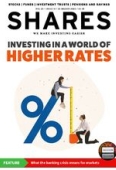Archived article
Please note that tax, investment, pension and ISA rules can change and the information and any views contained in this article may now be inaccurate.
Wild moves in markets after SVB collapse and Credit Suisse rescue

The evolving banking crisis sparked by the unravelling of Silicon Valley Bank is creating consequences that seemed unimaginable only a few weeks ago.
While a run on a bank is nothing new the speed of the SVB’s demise was something which speaks to the increasing power of social media.
Chief economist at wealth manager Kingswood Rupert Thompson says: ‘The problems at Silicon Valley Bank have certainly spread faster and further than we and most commentators were expecting.
‘This is in part down to the internet and social media which mean deposit runs on banks can occur far faster these days than in the past.’
The most startling market reaction to the crisis has been the sharp reversal of US two-year treasury yields. Shorter term yields reflect the expected path of official interest rates and so are closely watched by investors.
At the beginning of March, the two-year yield was above 5% and heading higher as the Federal Reserve seemed determined to stay on its hiking path to stamp out sticky inflation.
Yields have since dropped below 4%, representing a drop of 22% one of sharpest on record, wrong-footing hedge funds and other institutions which had expected interest rates to keep move higher. Futures markets are now pricing in cuts to interest rates later in 2023.
Meanwhile, volatility in the US bond markets reached its highest since 2008 in the week ended 17 March according to the ICE BofA Move index as trading volumes more than doubled.
WHAT WILL HAPPEN TO RATES NOW?
This article went to press before the key interest rate decisions from the Federal Reserve on 22 March and the Bank of England on the following day.
On 16 March the ECB (European Central Bank) increased its key interest rate by half a percentage point, something it had committed to weeks before the current crisis emerged.
ECB president Christine Lagarde seems to have convinced markets on the logic of hiking rates to fight inflation while dealing with financial market stability separately. In other words, the two policies are not seen as in conflict at the ECB.
Pressure on the banking sector subsided in Europe after the Swiss National Bank forged a merger between Credit Suisse (CSGN:SWX) and UBS (UBSN:SWX) although there has been consternation that some bond holders have been wiped out at the expense of shareholders.
The positive market reaction to the ECB’s rate increase may be enough to convince the Fed to continue its original course. There is a risk that pausing may cause markets to read something more into the regional US banking turmoil than is warranted.
Looking beyond the near-term, asset manager BlackRock is firmly in the rate hike camp: ‘We expect central banks to keep hiking to fight higher inflation – not come to the rescue.
‘We believe a further substantial deterioration in the banking situation is unlikely, even if it cannot be ruled out given confidence is fickle and lies at the heart of the issue.
‘The banking sector is fundamentally in much better shape than back in the GFC (great financial crisis) and the authorities seem to be taking the necessary action to prevent further marked contagion.’
WINNERS AMID THE UNCERTAINTY
Bitcoin and gold have benefited from the chaos in the financial sector with the former rising almost 40% to a nine-month high and the latter up by a tenth.
Bitcoin’s rise is ironic given the collapse of Silvergate and Signature, two banks which were integral to the cryptocurrency landscape.
Bitcoin has often been touted as a hedge against inflation but the reality over the last 18 months is that it tended to move in lockstep with risky assets.
The drop in interest rates has boosted the value of the Nasdaq 100 index where large cap tech is perceived as relatively safe and supported by strong balance sheets.
The tech sector had suffered the most against the backdrop of rising interest rates which theoretically lowers the value of their longer duration earnings growth.
Also helping sentiment towards the sector has been a shift in focus towards profitability rather than growth in response to overexpansion during lockdowns to meet booming online demand.
Investors have responded positively to job cuts at Facebook owner Meta Platforms (META:NASDAQ) and Amazon (AMZN:NASDAQ) which announced a further 9,000 layoffs this week on top of the 18,000 jobs cut in January.
Important information:
These articles are provided by Shares magazine which is published by AJ Bell Media, a part of AJ Bell. Shares is not written by AJ Bell.
Shares is provided for your general information and use and is not a personal recommendation to invest. It is not intended to be relied upon by you in making or not making any investment decisions. The investments referred to in these articles will not be suitable for all investors. If in doubt please seek appropriate independent financial advice.
Investors acting on the information in these articles do so at their own risk and AJ Bell Media and its staff do not accept liability for losses suffered by investors as a result of their investment decisions.
Issue contents
Feature
- Why the Credit Suisse bailout has failed to calm investors’ nerves
- What an escalating AI-powered search war might mean for media stocks
- Investing in a world of higher rates
- What should your investment portfolio look like in your 70s?
- Discover the beneficiaries of China’s big reopening in 2023
- Why a company’s longevity is important to some of the best fund managers

 magazine
magazine








